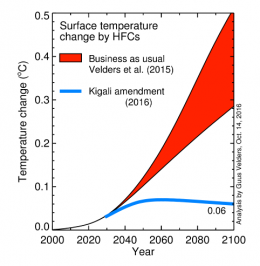Phasing out HFCs – A big win for our climate
19/10/2016

Last week’s news from Kigali, Rwanda, that hydrofluorocarbons (HFCs) emissions are being phased out globally is truly excellent news for our students and their successors. This single measure will remove up to 0.5°C warming at a time when global temperatures are more than 1°C above pre-industrial levels. In last December’s Paris Agreement, the world’s countries agreed a target maximum warning of 2°C or, if possible, 1.5°C. Without this phasing out of HFCs, agreed by nearly 200 countries as part of the Montreal Protocol , this would not be possible.
As an expert on ozone depletion, I was the lead author on the Chapter on Scenarios and Information for Policymakers in the 2014 WMO/UNEP Scientific Assessment on Ozone Depletion. It was this report that acted as scientific basis for the discussions in Kigali, and so I am delighted to see this action having been taken.

Source; Institute for Governance and Sustainable Development
The decision was reached in response to the Montreal Protocol on Ozone-Depleting Substances, whose goal is to protect the ozone layer, and represents a significant moment in the history of climate change talks and agreements.
Developed in the 1990s to replace ozone depleting substances, HFCs are powerful greenhouse gases and major contributors to global warming. Used mainly in air conditioners and refrigeration, they were listed among the seven greenhouse gases targeted by the UN Framework Convention on Climate Change.
Categories & Tags:
Leave a comment on this post:
You might also like…
From classroom to cockpit: What’s next after Cranfield
The Air Transport Management MSc isn’t just about learning theory — it’s about preparing for a career in the aviation industry. Adit shares his dream job, insights from classmates, and advice for prospective students. ...
Setting up a shared group folder in a reference manager
Many of our students are now busy working on their group projects. One easy way to share references amongst a group is to set up group folders in a reference manager like Mendeley or Zotero. ...
Company codes – CUSIP, SEDOL, ISIN…. What do they mean and how can you use them in our Library resources?
As you use our many finance resources, you will probably notice unique company identifiers which may be codes or symbols. It is worth spending some time getting to know what these are and which resources ...
Supporting careers in defence through specialist education
As a materials engineer by background, I have always been drawn to fields where technical expertise directly shapes real‑world outcomes. Few sectors exemplify this better than defence. Engineering careers in defence sit at the ...
What being a woman in STEM means to me
STEM is both a way of thinking and a practical toolkit. It sharpens reasoning and equips us to turn ideas into solutions with measurable impact. For me, STEM has never been only about acquiring ...
A woman’s experience in environmental science within defence
When I stepped into the gates of the Defence Academy it was the 30th September 2019. I did not know at the time that this would be the beginning of a long journey as ...






